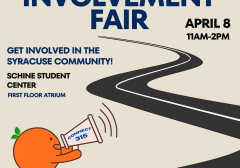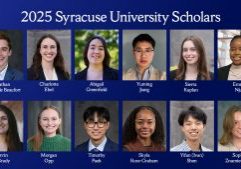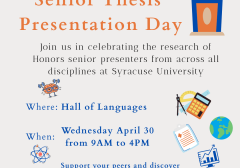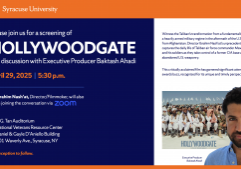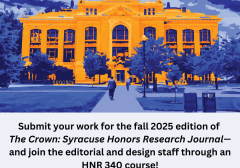
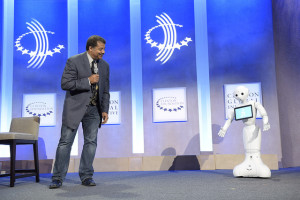 Students in Dave Reilly’s honors seminar this semester, Public Intellectuals and the Digital Commons, are expecting virtual visits to the class by some prominent public intellectuals.
Students in Dave Reilly’s honors seminar this semester, Public Intellectuals and the Digital Commons, are expecting virtual visits to the class by some prominent public intellectuals.
Slate’s Chief Political Correspondent Jamelle Bouie, the chair of the Philosophy Department at San Jose State University, ethicist and “lapsed chemist” Janet Stemwedel, and one of the web’s most popular and controversial independent bloggers, Shakesville’s Melissa McEwan will talk with the class via Skype about their work on- and offline and the key roles social media plays in their professional lives.
But this week students will be doing some virtual visiting of their own.
They’re “attending” the annual meeting of the Clinton Global Initiative, the four days of meetings, panel discussions, and presentations showcasing the efforts of the Clinton Foundation, the charitable organization founded by former President Bill Clinton to help corporations, charitable organizations, and individuals direct their philanthropic work and money to causes and places where it can be put to most immediate and practical use.
While Reilly was down in New York City to cover the annual meeting of the Clinton Global Initiative for his blog Lance Mannion.com, his students tagged along via various social media to cover it for the blogs they’ve built as the basic requirement for the course.
Reilly’s students, known on the class’s Facebook group page and their Twitter feed as the Digital Commoners, are attending the meeting by watching webcasts from the event, following various twitter feeds, researching on their own the people, causes, technologies, issues, ideas, and aid efforts discussed over the course of the four days of meetings, panel discussions, and presentations.
When they’re done, they’ll be reporting on what they saw and learned on their blogs.
Attendees at CGI, virtual and otherwise, can sit in as world leaders and leaders from the worlds of business, science, education, and the arts discuss work being done under the Clinton Foundation’s umbrella to bring solar energy and clean water to remote villages in Africa, increase educational and economic opportunities for women and girls in the developing world, help small island nations deal with the devastation of rising oceans brought on by climate change, protect rhinos from poachers, save honeybee populations, and more and more.
Among the panelists and presenters students will be hearing from are renowned oceanographer Sylvia Earle discussing sustainable oceans with President of the Republic of the Seychelles James Michel and actor and environmental activist Ted Danson; MIT professor, physician, and inventor Sangeeta Bhatia talking about her life-saving cancer research and her efforts to draw more young women into the field of biological research; .and the head of the Hayden Planetarium at the American Museum of Natural History, astrophysicist Neil deGrasse Tyson, interviewing Pepper the Robot.
The object of the assignment and the course, says Reilly, isn’t to teach a virtual nuts and bolts how-to approach to blogs, Twitter, Instagram, Vine, and other social media platforms.
The idea is to get them seeing social media as a part of their academic and later professional endeavors.
The working worlds of scholarship, research, and professional engagement have expanded far beyond local classrooms, libraries, labs, and office conference rooms and the number of potential colleagues and coworkers has increased exponentially.
Through the class, Reilly hopes, students will begin to see themselves as not just taking part in that larger, virtual conversation but, as honors students, see themselves as future leaders of the conversation.
As the kind of leaders and problem solvers who wind up on the stage at meetings of the Clinton Global Initiative.

